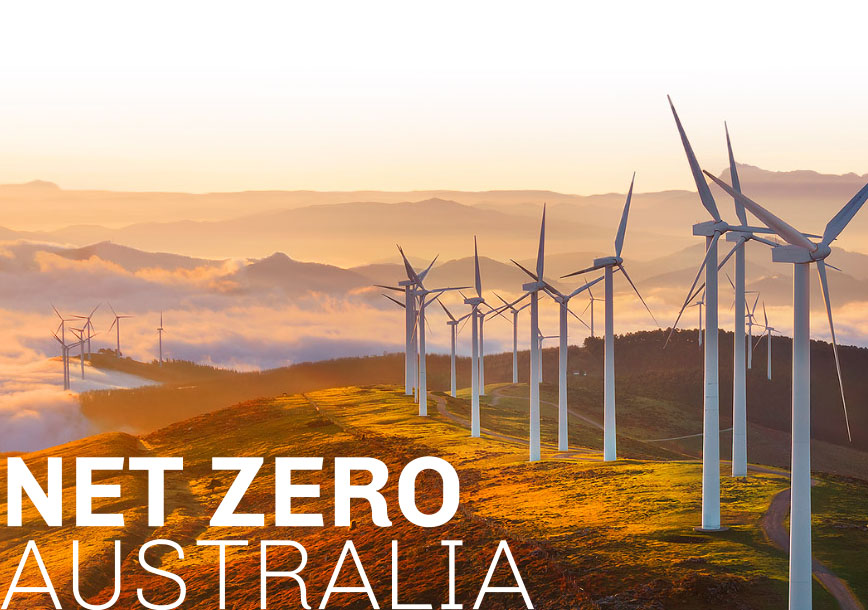News
Net zero is an immense challenge and a nation-building opportunity
INTERIM RESULTS FROM NET ZERO AUSTRALIA
The Net Zero Australia project today released uniquely detailed insights into the opportunities and challenges for Australia in transitioning to net zero emissions. The project is a research partnership between the University of Melbourne, the University of Queensland, Princeton University and international management consultancy Nous Group.
Key insights from the interim modelling
- Renewables will produce most or all domestic energy by 2050
- More productive use of energy can keep domestic demand about the same, despite population growth
- Carbon capture, utilisation and storage (CCUS) can play an important role, complementing renewables
- Unprecedented capital investment is needed, which will produce significant benefits
- Domestic energy’s share of GDP need not rise above today’s level, while being less prone to price shocks
- Clean energy can replace our fossil fuel exports
- The cost to export clean energy may rise, but should be competitive in a decarbonising global economy
- A large workforce with new skills will grow across the nation, particularly in northern Australia
- Emissions from farms, forestry and waste should fall, but are unlikely to reach net zero
- Large changes in land and sea use will occur, and will need careful planning and community engagement
Quotes attributable to Robin Batterham, Chair of the Net Zero Australia Steering Committee:
“Now that we have a national net zero target for domestic emissions, the challenge is to work out how the target can be achieved. This study provides insights that are objective, detailed and transparent. We hope it will help governments, businesses and the public to reach decisions on their contributions to the decarbonisation task.
“Our findings show there’s no two ways about it – to meet net zero by 2050, Australia must transform. Major and long-term investment is required in new renewable generation, electricity transmission, hydrogen supply chains, and more. New skills and training is needed to capitalise on Australia’s clean energy potential. This will create new costs, benefits and opportunities.
“Clean energy exports are a major opportunity. Global demand for clean energy is currently uncertain, but Australian exports should be competitive. We stand to gain large export revenues and a million new Australian jobs, if exported energy stays around today’s level.”
Background
Modelling approach
The Net Zero Australia project uses the approach pioneered by Princeton University’s Net Zero America project. It models the impacts of net zero scenarios on energy use, energy sources, costs and employment, and illustrates the transition with detailed mapping of the deployment of infrastructure across the nation. The decarbonisation of land use, agriculture and waste is assessed.
Pathways by which Australia’s energy export industry could be transformed to produce net zero emissions overseas by 2060 have also been analysed. Faster decarbonisation of domestic and export emissions will be modelled as part of the next stage of the study. Detailed interim report findings are available on the Net Zero Australia website.
The next phase of work will further explore the impacts on land and sea usage, variations of the scenarios, and the benefits and drawbacks of actions that may be taken by governments, companies and communities to mobilise investment and public support. Final reports will be released in 2023.
The project models impacts of transitioning to net zero via increased electrification and energy efficiency; the deployment of renewables; the production of hydrogen; the use of energy storage, clean power and transmission to ‘firm’ renewables; the use of carbon capture, utilisation and storage (CCUS); changes in land use and livestock management; and ‘onshoring’ of iron and aluminium production.
The modelling analyses the impact on emissions; energy demand; energy sources; the adoption of new appliances, industrial processes and vehicles; employment; land use; and costs. Later modelling will also examine the impact of changes in air pollution on public health.
Engagement and transparency
An Advisory Group is providing a wide range of insights and expertise. It includes nominees from the Australian Conservation Foundation, the Australian Council of Trade Unions, the Climate Council, Energy Consumers Australia, the National Native Title Tribunal, the Ethics Centre, the National Farmers Federation, St Vincent de Paul and the sponsors.
Funding
The project is funded by gifts and grants that preserve the independence of the project. Gold Level sponsors are Worley, Dow, the Future Energy Exports Cooperative Research Centre, APA Group and the Minderoo Foundation. The Future Fuels Cooperative Research Centre is the Silver sponsor.
